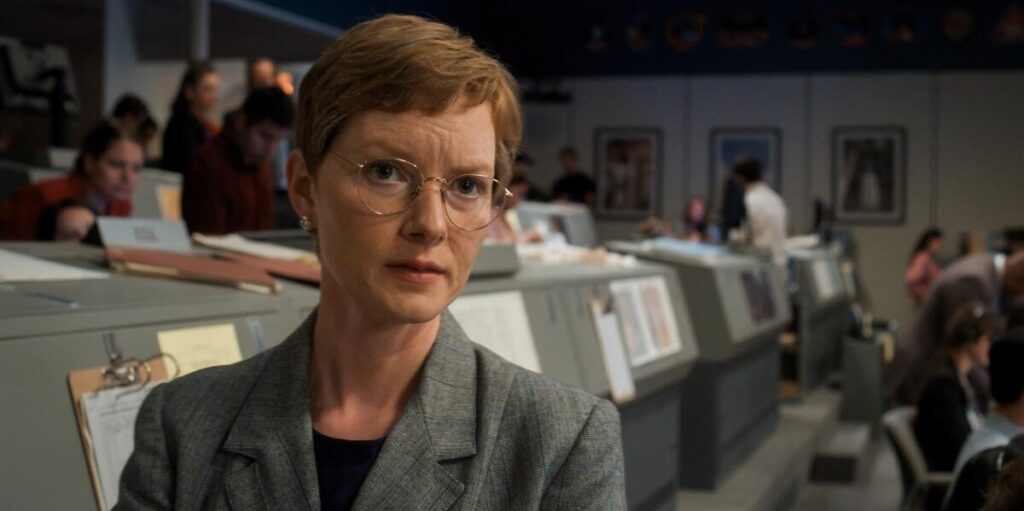Wrenn Schmidt was once at an event when a man approached her to discuss his visceral reaction to the decisions the actor’s character, Margo Madison, has made on “For All Mankind,” Apple TV+’s alternate-history space race drama.
Schmidt didn’t want to go into specifics about what was said, but she tells The Times that “it was clear that he was having a very strong reaction to the Margo storyline.” The actor wondered why this fan of the show felt so “emotional” about “the choices that she’s made because … especially in seasons 2 and 3, Margo is often choosing between a wrong and a wrong. There’s no good choice. There’s no easy choice.”
A brilliant mathematician and scientist with a determination as thick as her Alabaman drawl, Margo is named the first woman in NASA’s Mission Control and later becomes its flight director — positions that should have been celebrated but that always had a stench because, unbeknownst to her until much later, her mentor Wernher von Braun (Colm Feore) had Nazi ties.
Nevertheless, Margo persists in rising up the ranks. By Season 3, which is set in the 1990s, she’s the first female director of the Johnson Space Center in Houston. But she’s also an asset to Soviet Russia; sharing NASA trade secrets at first to help Sergei Nikulov (Piotr Adamczyk), her friend and the head of Russia’s space program, and then, after a decades-long con that played on their romantic flirtations, to protect him when the KGB threatens his life if she stops delivering intel.
In Season 3 of “For All Mankind,” Margo (Wrenn Schmidt) heads up the Johnson Space Center.
(Apple TV+)
“There’s that pivotal moment in Season 1 when she does not understand how Wernher von Braun could have chosen his work over human lives,” Schmidt says of Margo. “That hardline decision that she makes that she will never do the same is, in some ways, her undoing later on.”
“For All Mankind” co-showrunner Ben Nedivi, who created the series with co-showrunner Matt Wolpert and “Outlander” and “Battlestar Galactica’s” Ronald D. Moore, compares the debate over Margo’s actions to the ones about Edward Snowden, the National Security Agency whistleblower who defected to Russia in 2013, and his quest for government transparency.
“I think the word ‘traitor’ gets thrown around a lot,” Nedivi says of Margo. “But you know, knowing her and being with her for so long in her life, and seeing the decades and the passage of time, you understand where she’s coming from when she makes those decisions.”
Wolpert says that, in building the character, “we knew, as the protege of Wernher von Braun, that we wanted to have her following in his footsteps [and] to be confronted with some of these ideas of loyalty and where you rank your loyalty to science versus your loyalty to your country.”
The fourth season of “For All Mankind” jumps to a version of 2003 where Americans, Russians and even a few North Koreans are living peacefully (or at least coexisting) in a space station on Mars. Margo, meanwhile, is in her own cultural bubble; she’s an American defector in Moscow and using the pseudonym Margaret Reynolds. Having no other purpose than to merely exist, the former workaholic who kept changes of clothes in her office and cans of SlimFast in her desk drawer is spending her forced retirement hitting the snooze button, developing a detailed morning stretch regime and eating copious amounts of pastries while reading newspapers in the park. (Schmidt, who took a semester of Russian in college, says she did a “four-month crash course” in the language before filming this season. She says she’s by no means fluent “but I understand a lot more of it than I did before.”)
“I genuinely find space travel, or just even asking the question, ‘What is the purpose or the benefit or the goal of space travel?’ interesting,” Schmidt says. Comparatively, she says she wondered, “What would one of the smartest women in the world be doing with their time if she was basically a bird in a cage?”
Not that all of Margo’s time in Mother Russia has been blissful. Schmidt wanted her to have a limp this season, suggesting that someone who’d spent most of her life in the American South probably would not know how to walk on ice. Her accent has also been tweaked, much to the approval of Garrett Reisman, a former NASA astronaut and a consultant on the show. Schmidt says he emailed her to say “your Texas-Russian accent reminded me so much of the NASA guys trying their hardest to speak like a local over there.”

Wrenn Schmidt on her character, Margo: “What would one of the smartest women in the world be doing with their time if she was basically a bird in a cage?”
(Apple TV+)
Her situation is doubly unique because she left her office to defect to Russia just a few minutes before the Space Center was hit by a terrorist attack. Consequently, her colleagues who survived the attack believe her to be dead.
“Margo doesn’t necessarily think, ‘Oh, I was lucky that I wasn’t there,’” Schmidt says when asked whether Margo thinks this was a lucky break.
But, early in Season 4, Margo again lets her emotions get in the way. After protecting a friend during a sudden political demonstration, she was stuck in an interrogation room: the last place anyone wants to be, but a doubly bad situation if you’re someone in hiding.
Just three episodes into the series’ fourth season, it’s unclear whether Margo’s latest actions will turn her naysayers into sympathizers. Whatever happens next, though, some fans’ dislike of Margo is the latest example of an ongoing debate about who we define as an antihero on TV. Audiences rooted for characters like Tony Soprano in “The Sopranos” and Walter White in “Breaking Bad,” and those mens’ actions were considerably more deadly and self-aggrandizing than Margo’s.
“Something Matt and I have always faced in writing female characters in our career is that there tends to be a double standard,” Nedivi says. “When you’re writing a female character, you tend to get the note a lot more from executives of how ‘likable’ they are.”
Conditioned sexism could also turn Margo into someone to pity. Comparisons have been made to Martha Hanson, Alison Wright’s mousy FBI secretary on “The Americans” who was also duped by the KGB and also ultimately fled to Russia. The hashtag #PoorMartha was used on social media to typify fans’ glee at her susceptibility.
Either way, Schmidt believes Margo doesn’t care what you think.
“Margo doesn’t worry about other people’s perception of her,” says Schmidt. “Her concern is less about ‘what do people think of me?’ and more about ‘how are we pushing the boundaries of space travel?’”
The “For All Mankind” showrunners say they didn’t know about Martha when they began work on this series; otherwise, they would have given their character another name. Margo’s also not someone looking for a romantic relationship. The writers compare her flirtations with Sergei, which were slow burns that flickered through decades, to the long-and-winding courtship at the center of the book and movie “The Remains of the Day.”
Nedivi didn’t want to speculate as to whether Margo is a virgin, saying he’d rather leave that to audience interpretation. But Schmidt does think she’s had past paramours who never appeared on screen.
“I just think they always fell incredibly short compared to how fascinated and excited she was about her job,” she says.
Who needs a walk in the moonlight when you can send people to walk on the moon outright?

